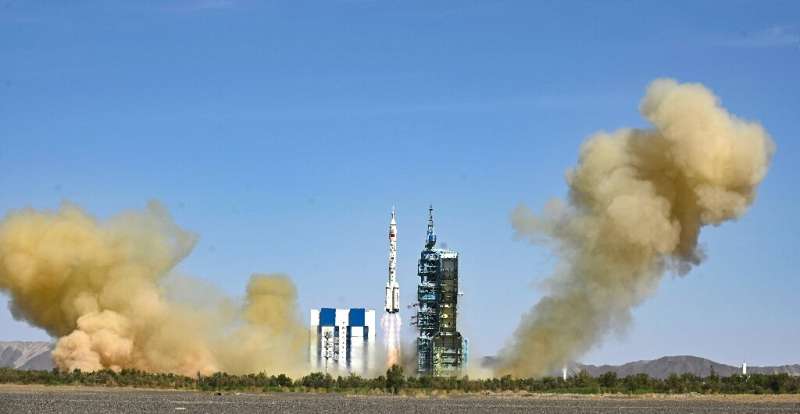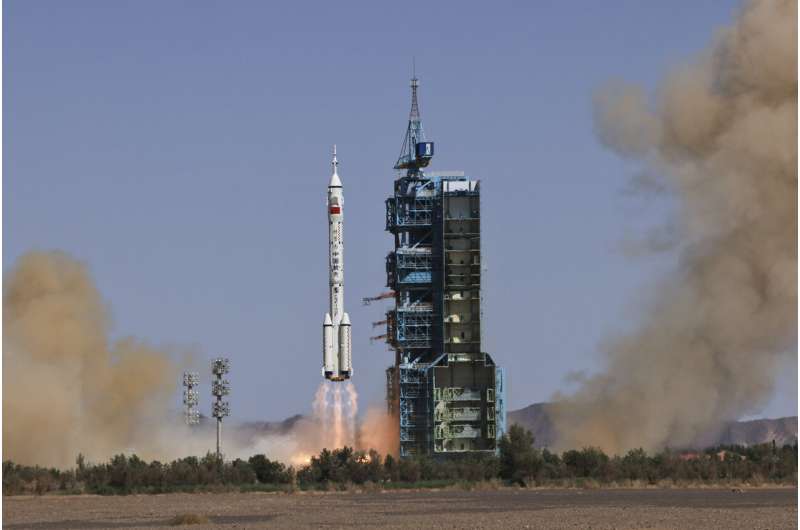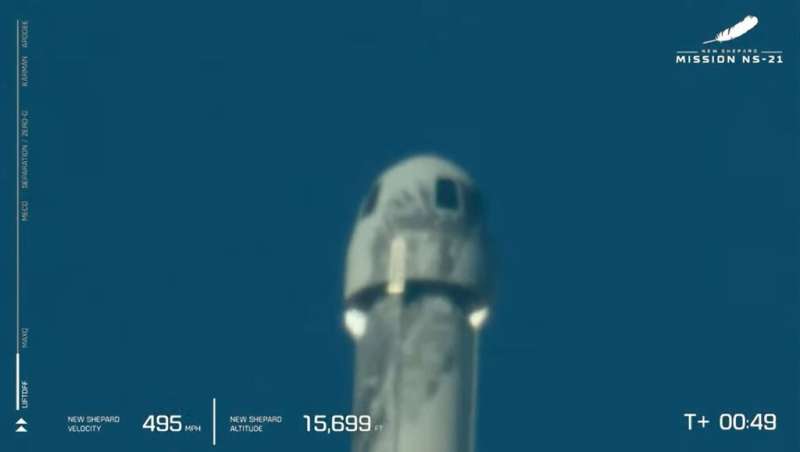
Copernical Team
Aegis Aerospace and Intuitive Machines team up for lunar science services
 Officials of space and defense technology company Aegis Aerospace Inc. and pioneering space company Intuitive Machines yesterday formally announced they have entered into the first Texas-based business-to-business contract to deliver a commercial science payload to the Moon.
This unique agreement extends Aegis Aerospace's Space Testing as a Service (STaaS) business model from Earth orbit t
Officials of space and defense technology company Aegis Aerospace Inc. and pioneering space company Intuitive Machines yesterday formally announced they have entered into the first Texas-based business-to-business contract to deliver a commercial science payload to the Moon.
This unique agreement extends Aegis Aerospace's Space Testing as a Service (STaaS) business model from Earth orbit t China discloses tasks of Shenzhou-14 crewed space mission
 The upcoming Shenzhou-14 crewed space mission will complete the construction of the Tiangong space station, with a basic three-module structure consisting of the core module Tianhe and the lab modules Wentian and Mengtian, according to the China Manned Space Agency (CMSA) on Saturday.
The mission will build the space station into a national space laboratory, said Lin Xiqiang, deputy direct
The upcoming Shenzhou-14 crewed space mission will complete the construction of the Tiangong space station, with a basic three-module structure consisting of the core module Tianhe and the lab modules Wentian and Mengtian, according to the China Manned Space Agency (CMSA) on Saturday.
The mission will build the space station into a national space laboratory, said Lin Xiqiang, deputy direct Subscale booster motor for future Artemis missions fires up at Marshall
 Engineers successfully fired a 2-foot-diameter, subscale solid rocket booster June 1, 2022, at NASA's Marshall Space Flight Center in Huntsville, Alabama.
The test, conducted in Marshall's East Test Area, produced 92,000 pounds of thrust and was done as part of the booster obsolescence and life extension (BOLE) program, providing an upgraded booster design for the evolved configuration of
Engineers successfully fired a 2-foot-diameter, subscale solid rocket booster June 1, 2022, at NASA's Marshall Space Flight Center in Huntsville, Alabama.
The test, conducted in Marshall's East Test Area, produced 92,000 pounds of thrust and was done as part of the booster obsolescence and life extension (BOLE) program, providing an upgraded booster design for the evolved configuration of Mars is all shook up
 Recently, 47 new 'marsquakes' (that is, quakes on Mars) have been detected by Professor Hrvoje Tkalcic from the Australian National University and Professor Weijia Sun from the Chinese Academy of Science. The discovery suggests Mars to be more seismically active than previously thought.
The findings also provide clues about the composition of Mars and how other rocky planets in our Solar S
Recently, 47 new 'marsquakes' (that is, quakes on Mars) have been detected by Professor Hrvoje Tkalcic from the Australian National University and Professor Weijia Sun from the Chinese Academy of Science. The discovery suggests Mars to be more seismically active than previously thought.
The findings also provide clues about the composition of Mars and how other rocky planets in our Solar S Three Chinese astronauts arrive at space station

Three Chinese astronauts arrived at the country's space station on Sunday, the Chinese space agency for human flights said, the latest stride in Beijing's aim to become a major space power.
The trio blasted off in a Long March-2F rocket at 0244 GMT from the Jiuquan launch center in northwestern China's Gobi desert, reported state broadcaster CCTV.
The team is tasked with "completing in-orbit assembly and construction of the space station", as well as "commissioning of equipment" and conducting scientific experiments, state-run CGTN said Saturday.
The astronauts entered the central module of the Tiangong station at around 1250 GMT, the China Manned Space Agency (CMSA) said. The journey took about "seven hours of flight", CCTV reported.
Tiangong, which means "heavenly palace", is expected to become fully operational by the end of the year.
Three Chinese astronauts dock at space station
 Three Chinese astronauts docked at the country's space station on Sunday, the state broadcaster said, marking a new milestone in Beijing's drive to become a major space power.
The trio blasted off in a Long March-2F rocket at 0244 GMT from the Jiuquan launch centre in northwestern China's Gobi desert, said broadcaster CCTV.
The team is tasked with "completing in-orbit assembly and const
Three Chinese astronauts docked at the country's space station on Sunday, the state broadcaster said, marking a new milestone in Beijing's drive to become a major space power.
The trio blasted off in a Long March-2F rocket at 0244 GMT from the Jiuquan launch centre in northwestern China's Gobi desert, said broadcaster CCTV.
The team is tasked with "completing in-orbit assembly and const China launches mission to complete space station assembly

China on Sunday launched a new three-person mission to complete assembly work on its permanent orbiting space station.
China sends three astronauts to complete space station
 China on Sunday launched a rocket carrying three astronauts on a mission to complete construction on its new space station, the latest milestone in Beijing's drive to become a major space power.
The trio blasted off in a Long March-2F rocket at (0244 GMT) from the Jiuquan launch center in northwestern China's Gobi desert, said state broadcaster CCTV, with the team to spend six months expandi
China on Sunday launched a rocket carrying three astronauts on a mission to complete construction on its new space station, the latest milestone in Beijing's drive to become a major space power.
The trio blasted off in a Long March-2F rocket at (0244 GMT) from the Jiuquan launch center in northwestern China's Gobi desert, said state broadcaster CCTV, with the team to spend six months expandi Bezos's Blue Origin makes 5th crewed flight into space

Jeff Bezos's company Blue Origin flew six tourists into space for a 10-minute ride Saturday, successfully carrying out its fifth crewed mission.
The white spacecraft called New Shepard lifted off with a roar from a desert spot in west Texas at 8:26 local time (1326 GMT).
The crew hooted with glee as the rocket reached space, a Blue Origin webcast showed.
The flight included engineer Katya Echazarreta, who at 26 became the youngest American woman in space. The Guadalajara native also became the first Mexican-born woman to go into space.
China plans to complete space station with latest mission





































